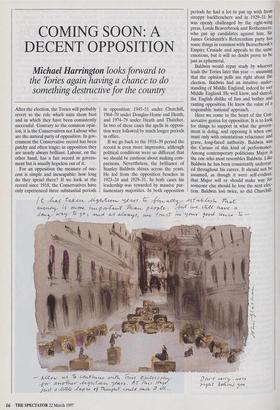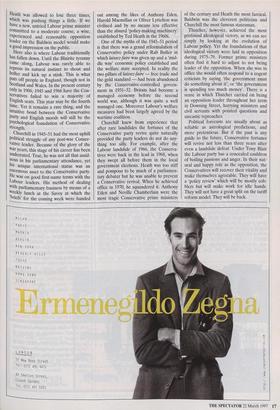COMING SOON: A DECENT OPPOSITION
Michael Harrington looks forward to
the Tories again having a chance to do something destructive for the country
After the election, the Tories will probably revert to the role which suits them best and in which they have been consistently successful. Contrary to the common opin- ion, it is the Conservatives not Labour who are the natural party of opposition. In gov- ernment the Conservative record has been patchy and often tragic; in opposition they are nearly always brilliant. Labour, on the other hand, has a fair record in govern- ment but is usually hopeless out of it.
For an opposition the measure of suc- cess is simple and inescapable: how long do they spend there? If we look at the record since 1918, the Conservatives have only experienced three substantial periods in opposition: 1945-51 under Churchill, 1964-70 under Douglas-Home and Heath, and 1974-79 under Heath and Thatcher. In two of these cases the spells in opposi- tion were followed by much longer periods in office.
If we go back to the 1918-39 period the record is even more impressive, although political conditions were so different that we should be cautious about making com- parisons. Nevertheless, the brilliance of Stanley Baldwin shines across the years. He led from the opposition benches in 1923-24 and 1929-31. In both cases his leadership was rewarded by massive par- liamentary majorities. In both opposition periods he had a lot to put up with from stroppy backbenchers and in 1929-31 he was openly challenged by the right-wing press, Lords Beaverbrook and Rothermere, who put up candidates against him. Sir James Goldsmith's Referendum party has some things in common with Beaverbrook's Empire Crusade and appeals to the same emotions, but it will no doubt prove to be just as ephemeral.
Baldwin would repay study by whoever leads the Tories later this year — assuming that the opinion polls are right about the election. Baldwin had an intuitive under- standing of Middle England; indeed he was Middle England. He well knew, and shared, the English dislike of fuss and bother and ranting opposition. He knew the value of a responsible 'national' approach.
Here we come to the heart of the Con- servative genius for opposition. It is to look for things to support in what the govern- ment is doing, and opposing it when one must only with ostentatious reluctance and grave, long-faced authority. Baldwin was the Caruso 'of this kind of performance. Among contemporary politicians Major is the one who most resembles Baldwin. Like Baldwin he has been consistently underrat- ed throughout his career. It should not be assumed, as though it were self-evident, that Major will or should make way for someone else should he lose the next elec- tion. Baldwin lost twice, so did Churchill. Heath was allowed to lose three times, which was pushing things a little. If we have a new, untried Labour prime minister committed to a moderate course, a wise, experienced and reasonable opposition leader on the Baldwin model would make a good impression on the public. Here also is where Labour traditionally has fallen down. Until the Blairite tyranny Came along, Labour was rarely able to repress its natural instinct to shout and holler and kick up a stink. This is what puts off people in England, though not in Scotland and Wales. In the present century only in 1906,1945 and 1966 have the Con- servatives failed to win a majority of English seats. This year may be the fourth time. Yet it remains a rare thing, and the intuitive bond between the Conservative party and English moods will still be the psychological foundation of Conservative strength.
Churchill in 1945-51 had the most uphill political struggle of any post-war Conser- vative leader. Because of the glory of the war years, this stage of his career has been underrated. True, he was not all that assid- uous in his parliamentary attendance, yet his unique international status was an enormous asset to the Conservative party. He was on good first-name terms with the Labour leaders. His method of dealing with parliamentary business by means of a weekly lunch at the Savoy at which the briefs' for the coming week were handed out among the likes of Anthony Eden, Harold Macmillan or Oliver Lyttelton was civilised and by no means less effective than the absurd 'policy-making machinery' established by Ted Heath in the 1960s.
One of the myths of the 1945-51 period is that there was a grand reformulation of Conservative policy under Rab Butler in which laissez-faire was given up and a 'mid- dle way' economic policy established and the welfare state accepted. In reality the two pillars of laissez-faire — free trade and the gold standard — had been abandoned by the Conservative-controlled govern- ment in 1931-32. Britain had become a managed economy before the second world war, although it was quite a well managed one. Moreover Labour's welfare measures had been largely agreed by the wartime coalition.
Churchill knew from experience that after rare landslides the fortunes of the Conservative party revive quite naturally provided the party leaders do not do any- thing too silly. For example, after the Labour landslide of 1966, the Conserva- tives were back in the lead in 1968, when they swept all before them in the local government elections. Heath was too stiff and pompous to be much of a parliamen- tary debater but he was unable to prevent a Conservative revival. When he achieved office in 1970, he squandered it. Anthony Eden and Neville Chamberlain were the most tragic Conservative prime ministers of the century and Heath the most farcical. Baldwin was the cleverest politician and Churchill the most famous statesman.
Thatcher, however, achieved the most profound ideological victory, as we can see simply by looking at the evolution of Labour policy. Yet the foundations of that ideological victory were laid in opposition during 1975-79. Former prime ministers often find it hard to adjust to not being leader of the opposition. When she was in office she would often respond to a cogent criticism by saying 'the government must do something about it', or 'the government is spending too much money'. There is a sense in which Thatcher carried on being an opposition leader throughout her term in Downing Street, harrying ministers and civil servants with pointed questions and sarcastic reproaches.
Political forecasts are usually about as reliable as astrological predictions, and more pretentious. But if the past is any guide to the future, Conservative fortunes will revive not less than three years after even a landslide defeat. Under Tony Blair the Labour party has a concealed cauldron of boiling passions and anger. In their nat- ural and happy role as the opposition, the Conservatives will recover their vitality and make themselves agreeable. They will have a 'policy review' which will be mostly cob- blers but will make work for idle hands. They will not have a great split on the tariff reform model. They will be back.



































































 Previous page
Previous page